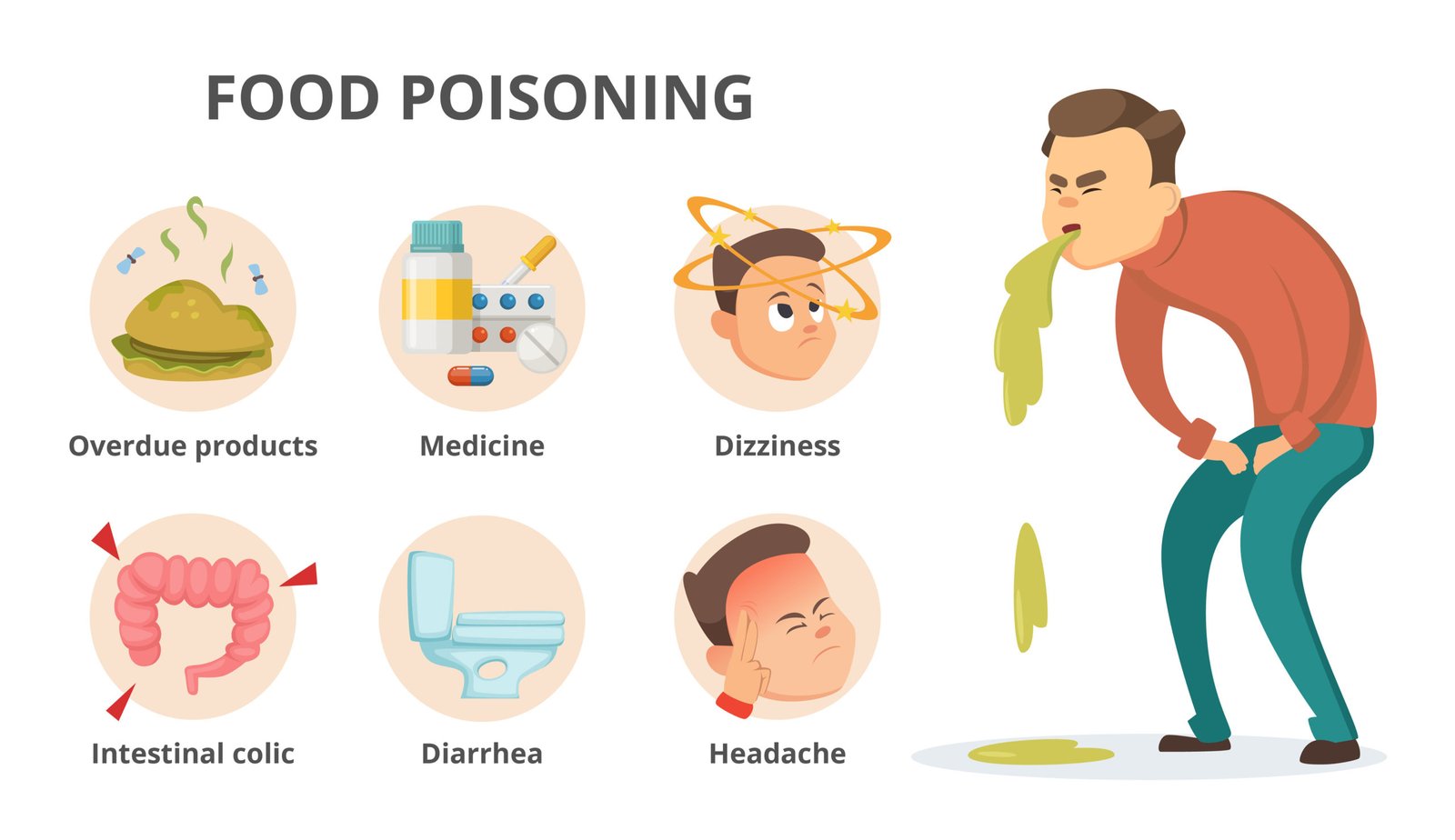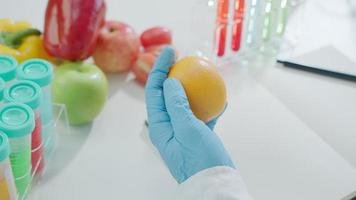Consuming tainted food or drinks that contain dangerous germs, viruses, parasites, or poisons can result in food poisoning.
Within hours or days after consumption, symptoms such as nausea, vomiting, diarrhea, stomach discomfort, and fever are common. Undercooked meats, unpasteurized dairy products, and tainted fruits and vegetables are frequently the culprits.
To avoid food illness, proper food handling, cooking, and hygiene procedures are crucial. It is vital to follow safe food preparation and consumption practices since in extreme circumstances, it can result in dehydration, organ failure, or even death.

Food poisoning symptoms.
- Contaminated Food Handling: When food is prepared improperly, bacteria can grow and cause contamination and foodborne illnesses.
- Cross-contamination: Hazardous microorganisms can be transferred from raw meats to prepared foods, raising the possibility of foodborne illnesses.
- Improper Cooking: Consuming undercooked food, particularly meats and eggs, can expose a person to bacteria like Salmonella or E. coli that can cause disease.
- Inadequate Refrigeration: Foodborne illnesses are more likely when perishables are not stored at the right temperature, which promotes bacterial development.
- Unsanitary Conditions: Food poisoning risk increases when foodborne pathogens are introduced into food through unclean hands, utensils, and kitchen surfaces.
- Raw or Unpasteurized Products: Eating raw milk, raw shellfish, or unpasteurized cheese raises the possibility of contracting an infection by exposing it to dangerous microorganisms.
- Contaminated Water: Drinking contaminated water or ice can cause the body to become infected with germs, resulting in foodborne illnesses and gastrointestinal infections.
- Cross-Contamination from Pets: Negligent handling of pet food or pet-related products can spread pathogenic bacteria and increase the risk of foodborne illnesses.
- Infected Food Handlers: Food produced by people who don’t wash their hands well or who have communicable diseases can spread germs to other people, which puts customers at risk.
- Consuming rotten or Expired Food: Consuming rotten or expired food can expose people to toxic substances, bacteria, or viruses, which can cause food poisoning.

Identifying food poisoning.
- Sources of Contamination: Eating contaminated food—typically caused by bacteria, viruses, parasites, or toxins—leads to food poisoning. Hygiene and proper food handling procedures are essential preventive measures.
- Symptoms and onset: Identify symptoms that usually show up hours or days after consumption, such as nausea, vomiting, diarrhea, and fever. Timely identification promotes appropriate care and healing.
- Common Causes: Raw seafood, unpasteurized dairy, undercooked meats, and cross-contamination are frequently identified as culprits. By being aware of high-risk foods and using safe preparation techniques, foodborne illness risk can be reduced.
The most common types of food poisoning.
- Salmonella: Undercooked or raw eggs and chicken are frequent offenders. Fever, diarrhea, and cramping in the abdomen are among the symptoms that typically manifest 6–72 hours after consumption.
- Campylobacter: Usually from unpasteurized milk, tainted water, and undercooked poultry. Within two to five days of exposure, symptoms such as cramps, nausea, diarrhea, and fever appear.
- Undercooked beef or contaminated water are the two main sources of Escherichia coli. Severe abdominal pain, vomiting, and diarrhea—often bloody—come on one to ten days following exposure.
- Listeria: Associated with unpasteurized dairy products, soft cheeses, and deli meats. The development of symptoms can be anywhere from a few days to weeks, and they include fever, aches in the muscles, and digestive problems.
- Norovirus: Often found in tainted water and food. Symptoms include abrupt vomiting, diarrhea, and cramping in the stomach that usually start 12–48 hours after exposure and remain for one to three days.

8 ways to treat or diagnose food poisoning.
- Diagnosis: To determine the cause of food poisoning, medical professionals may inquire about symptoms, do tests on blood or stool, and examine recent meals.
- Hydration: To avoid dehydration, replace lost fluids from vomiting and diarrhea by consuming an ample amount of fluids, such as water or oral rehydration treatments.
- Antibiotics (if necessary): Doctors may recommend antibiotics for patients with severe bacterial infections, although their necessity varies depending on the particular bacteria causing the sickness.
- Anti-Vomiting Drugs: By reducing nausea and vomiting, anti-vomiting drugs facilitate the body’s healing process.
- Probiotics: Similar to friendly bacteria, these can be found in some foods or taken as supplements to help balance the good bacteria in the stomach.
- Steer Clear of Irritating Foods: Give your stomach and intestines time to repair throughout your recuperation by avoiding foods that are hot, greasy, or difficult to digest.
- Rest: To help your body fight against the illness and replenish energy, get lots of rest.
- Hospital Care (if necessary): Hospitalization may be required for close observation, IV fluids, and further medical support in severe situations, particularly for vulnerable patients.
How to prevent food poisoning?
- Keep Raw and Cooked Foods Apart: To avoid cross-contamination and bacterial transfer, keep raw and cooked food on different cutting boards and utensils.
- Cook Often: Make sure that eggs, meats, and poultry are cooked to safe temperatures that eradicate dangerous pathogens like E. coli and Salmonella.
- Appropriate Storage: To minimize bacterial growth and lower the danger of contamination and spoiling, refrigerate perishable items as soon as possible and store them at the right temperature.
- Steer Clear of uncooked or Undercooked Eggs: Dishes like uncooked cookie dough or some sauces contain raw or undercooked eggs, which increases the risk of contracting Salmonella.
- Safe Water and Ice: To avoid microbial contamination, only drink treated and safe water and exercise caution when it comes to the quality of the ice.
- Keep in mind expiration dates: To prevent consuming damaged or possibly contaminated food, regularly check food expiration dates and discard expired items.

Is food poisoning contagious?
No, food poisoning itself is not contagious. It results from consuming contaminated food or water. However, some pathogens causing foodborne illnesses can spread through person-to-person contact if proper hygiene is not maintained. It’s crucial to practice good handwashing and prevent cross-contamination to minimize the risk of transmission.
In summary, preventing food poisoning is critical to maintaining the health of both individuals and communities. One can greatly lower their risk of contracting a foodborne illness by being aware of the common causes, symptoms, and prevention actions. Ensuring food safety requires careful handling, thorough cooking, and strict attention to hygiene protocols. In the event of food poisoning, promptly recognizing symptoms and obtaining the necessary medical care are essential actions to take. By raising awareness and taking preventative action, people may minimize the possible health effects of tainted food and enjoy a safer and healthier dining experience. Recall that the best defense against foodborne illnesses and the promotion of general health is knowledge and diligence in food preparation and consumption.
